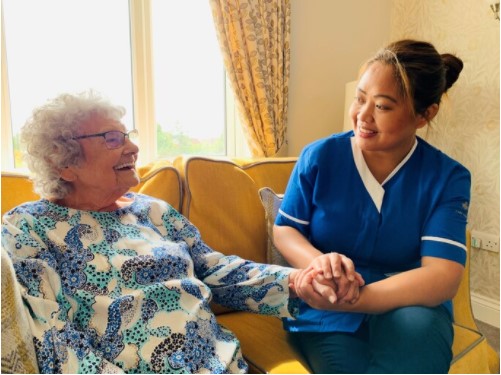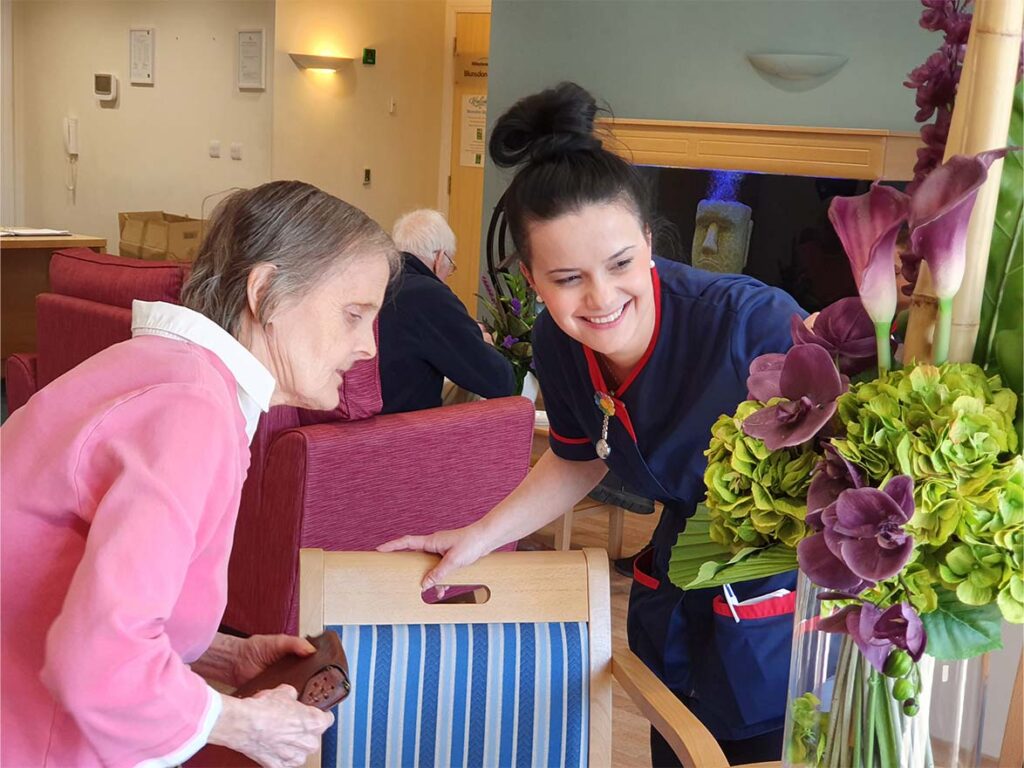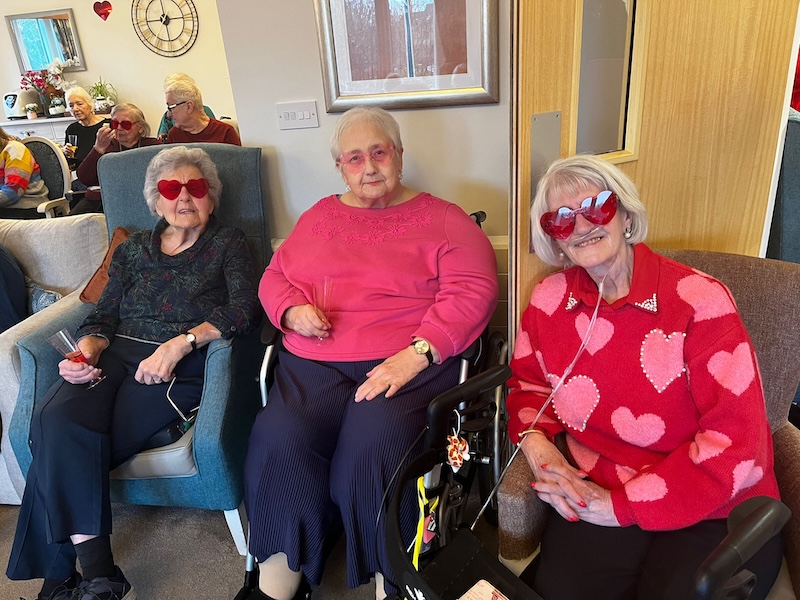How to Get an Elderly Person into a Care Home

Elderly people moving into a care home is something that has increased in recent years across the UK. There are a variety of benefits that a care home brings, including helping elderly people to live independently whilst receiving the care they need and freeing themselves from any concerns they may encounter during daily life relating to household costs and chores. Whether you choose to reside in a nursing home, residential home, or all-inclusive care home, there will be care professionals available to offer 24/7 support.
Choosing to move into a care home provides not only the individual receiving elderly care but their loved ones peace of mind too. However, this decision is not an easy one as it involves fundamental changes including leaving your own home and familiar surroundings which can sometimes result in complex emotions and uncertainty.
Having An Open Conversation - Family Member to Care Seeker
It is essential to involve both you, the family member, and the person seeking care in the process of moving into a care home. It may not be a suitable option for your elderly relatives to continue living in their own homes, but the decision is still not an easy one. When discussing the consideration of moving into a care home, make sure you bring up the topic sensitively and at the right time, ensuring that they have their own say. Reiterating that care homes are the most appropriate option for them and why can help make them understand and bring them around to the idea.
By having an open conversation, you can create a better understanding of what type of care home works for them, and they will also become more comfortable with the idea. It's also important to reiterate that the main benefit of moving into a care home is the 24-hour care and support that is provided by health and social care professionals who are dedicated to supporting someone's health and wellbeing. As well as this, living in a care home provides a group living setting that provides older people with social opportunities and an active lifestyle.
It may be beneficial to involve a care home in the initial conversations, as they can offer their expert advice and guidance and offer peace of mind to residents and their family members. There is also the opportunity to go on a tour of different care homes and nursing homes, which will also give an idea of what factors to consider and show off the benefits that can be reaped by elderly people.
Involve The Care Seeker in Any Decisions
Ultimately, it is the care seeker that will be affected by any decision made so it is essential that they are involved if possible. It is important to make sure your relative agrees with the decision and it should be taken into consideration if the person refuses any ideas you bring up.
During any visits to potential care homes, the individual should be encouraged to ask questions and voice anything they feel concerned about. This gives them the opportunity to be reassured and will help them understand that this transitional phase will be beneficial to them.
It is important to put into place a power of attorney if the individual has a more complex condition meaning they require more specialist care such as dementia care, as they may not have the mental capacity to make these decisions. Despite this, it is still important to involve the individual in need of care in the decision-making process as much as possible to alleviate any concern, stress, and confusion.

Consider the Needs of the Individual
Each individual has different medical and personal care requirements that will be laid out in a personalised care plan, making it easier for their needs to be monitored and met. However, there are so many different care types that need to be considered. A good care home or social services will help you to establish the most appropriate type of care by assessing the personal care, physical health, mobility, mental capacity, and care needs of the elderly person.
Upon this, you can begin to research different care homes in your local area or what other options may be appropriate for you, whether it be all-inclusive care homes, residential care homes, or nursing homes. Make sure to not settle for the first care home you visit and find one that can fully cater to the needs of your loved one.
Research Different Care Homes In The Local Area
A care home is more than just a care provider, so it is important to find somewhere that the individual feels comfortable and at home. A good care home should offer an environment that suits the individual and provides facilities to support their interests. After selecting a location, it is crucial to create a shortlist of homes to visit. Each care home will have slight variations in services and amenities, making it essential to choose one that offers the appropriate care and lifestyle for you or your loved one.
One way you can evaluate the care home's quality is by reviewing its most recent inspection report, which provides insights from a regulatory board on its operational practices. In England, the regulatory board that inspects care homes is the Care Quality Commission.
Another option is to read reviews on platforms such as carehome.co.uk, as these contain the opinion of other people who have experienced the care home, meaning you can get a general answer and opinion on a care home before making your final decision.
During your visits, it is important to enquire about the available food options and the activities provided, including any organised day trips that may be of interest to you or your loved one. Some local care homes will offer more wellbeing support than others, so thorough research will be vital to find the right care home for you or your relative.
Understanding All Types of Costs
UK care homes are amongst the most expensive in Europe according to carehome.co.uk, so it is very important to understand what kind of costs you will be paying to live in a residential care home or a nursing home.
The exact costs depend on what type of care home you choose to live in, the location, and any facilities and amenities that care homes offer their residents. All-inclusive care homes are generally more expensive but often cover the majority of costs that are incurred when staying in a care home meaning residents and their loved ones can have peach of mind with no extra hidden charges.
Local authorities are on hand to make you aware of any alternatives if you can't afford self-funding. This would be carried out through a financial assessment, which would outline the assistance you can receive and allocate you a top-up fee if it is appropriate.
Seeking Advice From A Professional Carer or Local Authority
While the internet is a valuable source of information when it comes to moving an elderly individual into a care home, seeking guidance from a professional can be a greater point of reassurance and understanding.
Speaking with an industry professional, such as a social worker from the local council or local authority can usually provide the answers you need to navigate the challenging transition when choosing to move into a care home. These social services can address any worries you may have, ensuring that your loved one has their elderly care requirements met and you feel comfortable with the facility you are choosing.
Many care homes also offer a complimentary service to provide advice from a qualified nurse or carer to family members seeking information about care and facilities, further assisting in understanding the crucial information that needs to be considered.

Exceptional Tailored Care in Wiltshire
Ridgeway Rise is a purpose-built care home offering a first-class lifestyle in Swindon Wiltshire. Residents are able to receive the highest quality care services, including Residential Care, Nursing Care, Dementia Care, Respite Care, and Palliative Care from our team of dedicated and passionate health professionals that are trained to cater to a wide range of care needs. We understand that it can be a difficult time when making the decision to move into a care home and we are here to fully support older people and their family members with any queries or concerns they may have.
At our all-inclusive care home, we offer a variety of facilities and amenities for residents to make use of including a hair & beauty salon, day trips out of the home, a cinema, and a tailored activities programme. This means our residents are living independently and filling their days how they wish, but still have access to support 24/7.
We adopt a person-centred approach to care, collaborating with our residents and any friends or relatives to carry out a needs assessment and best etermine the health and personal care needs of each individual.
Find Out More About Ridgeway Rise and Get in Touch
We encourage any questions you have regarding our care or life at Ridgeway Rise Care Home. Our friendly team is here to support you and provide you with answers. Please book a tour with us or get in touch with a member of our team. We look forward to helping you.





